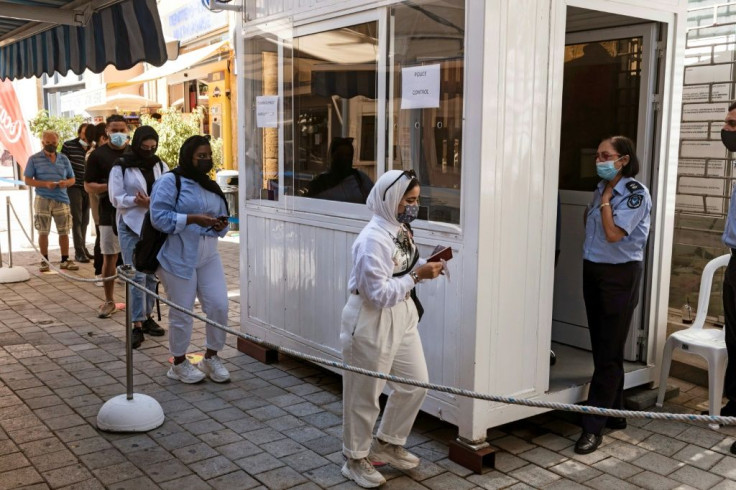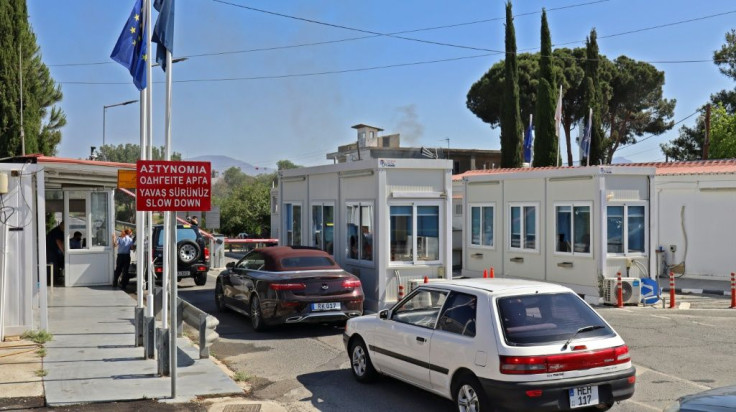Cyprus North-south Crossings Reopen As Covid Curbs Eased
Crossing points reopened Friday along the UN-patrolled ceasefire line that divides Cyprus as coronavirus restrictions first imposed 15 months ago were finally eased.
The crossings, including the iconic Ledra Street pedestrian checkpoint in the heart of the divided capital Nicosia, reopened without fanfare.
Pentaliotis Panayiotis, 35, was among the first Greek Cypriots to pass through the reopened crossing to the breakaway Turkish Cypriot north.
"It's a good step for both communities to get closer after a year and a half of not being able to meet," he said.
"Our goal is not to open border crossings but to reach a general solution that includes no borders within our country, but nonetheless, it's a step to help both communities to get closer."
The reopenings were the fruit of several weeks of intense discussions between Greek- and Turkish-Cypriot officials and the United Nations.

Greek Cypriot leader Nicos Anastasiades and his Turkish Cypriot counterpart Ersin Tatar "confirmed agreement on synchronising the two sides' respective Covid-19 measures concerning crossings and on reopening all crossing points from June 4," a UN statement said this week.
For the time being, travellers will still need proof of a negative antigen or PCR test to cross.
A technical committee made up of Greek- and Turkish-Cypriot representatives will meet fortnightly to review the requirements using a colour-coded risk assessment scheme.
The current orange alert status could be reduced to green, which would mean the lifting of all restrictions, or raised to dark red, which would signal the crossings are closed to the general public.
Under normal circumstances, thousands cross the ceasefire line each day to work, study or seek medical treatment.
In Nicosia, many more cross as pedestrians to shop or dine out.
Rozhan Amiri, a 19-year-old Iranian student in Cyprus, was delighted to be able to see her boyfriend in the north. "Now that it's open I'm so happy, I couldn't wait to cross the border," she said.

The reopening of the crossings was already widely welcomed when it was first announced on Wednesday.
"Great to see today's announcement that the crossings will reopen on Friday! Allowing Cypriots to meet, trade, and move freely benefits all who call this island home," tweeted US ambassador Judith Garber.
There had been mounting calls for the crossings to reopen after new coronavirus cases among both Greek- and Turkish-Cypriots fell sharply.
The Mediterranean island is divided between areas controlled by the Republic of Cyprus -- a European Union member state -- and the breakaway Turkish Republic of Northern Cyprus, recognised only by Ankara.
The Republic of Cyprus shut four of the nine crossings in late February 2020 in the first such closure since the crossings opened in 2003.
The remaining crossings were closed after the north reported its first case of coronavirus on March 10.
Some restrictions were gradually lifted for certain groups at designated checkpoints, such as Turkish Cypriot pupils attending schools in the government-controlled south.
The UN peacekeeping mission, which patrols the ceasefire line, hailed the reopenings as a return to the situation before the pandemic hit.
It said the reopening of all crossing points would "facilitate free movement, promote people to people contacts, build trust and have an overall positive socio-economic impact across the island".
Since the pandemic hit early last year, the Republic of Cyprus has reported 72,626 Covid cases and 362 deaths.
Turkish Cypriot authorities have reported 7,375 cases and 33 deaths.
© Copyright AFP {{Year}}. All rights reserved.





















